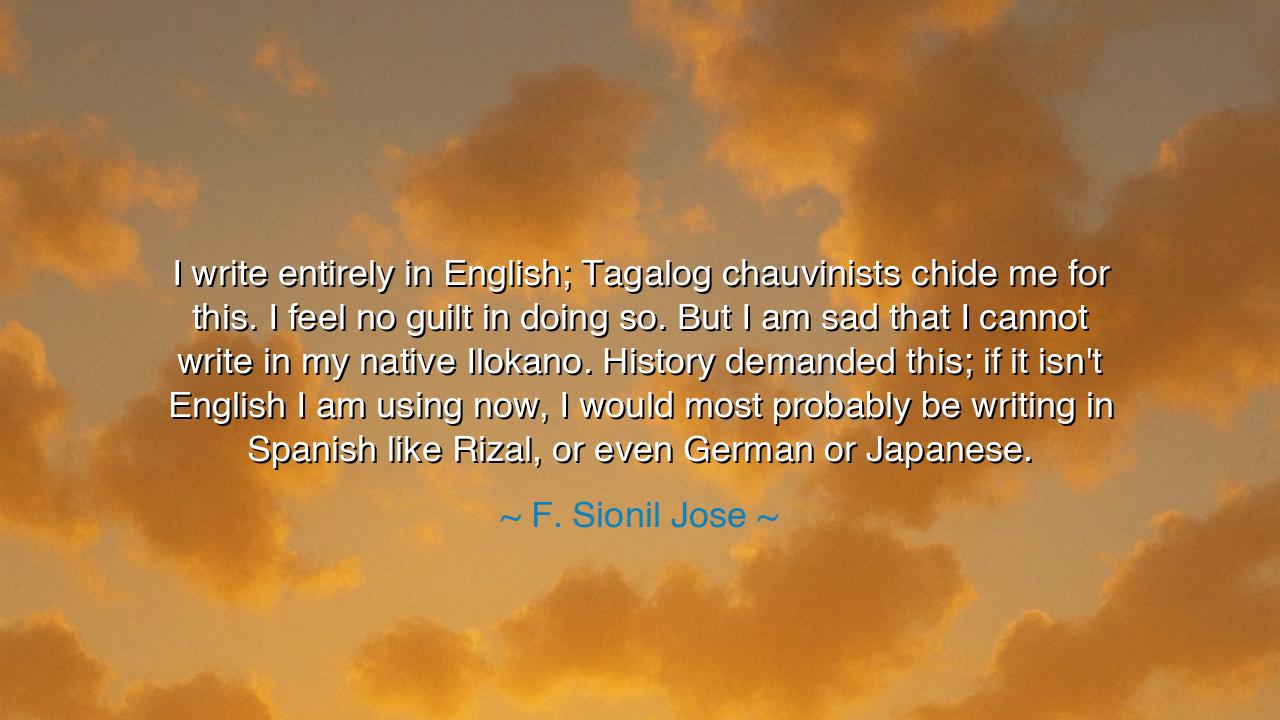
I write entirely in English; Tagalog chauvinists chide me for
I write entirely in English; Tagalog chauvinists chide me for this. I feel no guilt in doing so. But I am sad that I cannot write in my native Ilokano. History demanded this; if it isn't English I am using now, I would most probably be writing in Spanish like Rizal, or even German or Japanese.






F. Sionil Jose, the great Filipino novelist, once declared: “I write entirely in English; Tagalog chauvinists chide me for this. I feel no guilt in doing so. But I am sad that I cannot write in my native Ilokano. History demanded this; if it isn’t English I am using now, I would most probably be writing in Spanish like Rizal, or even German or Japanese.” These words echo not only the struggle of one writer but the struggle of entire nations whose voices have been shaped and scarred by conquest. In them lies the eternal truth: that language is both a gift and a wound, both a tool of expression and a mark of history’s heavy hand.
The ancients knew the power of language. The Greeks who wrote in Attic Greek preserved their thought for centuries, while their neighbors whose tongues were not recorded have vanished into silence. To write is to secure immortality, but to write in the tongue of the conqueror is to carry within every word the memory of subjugation. Jose, with clarity and sorrow, admits that his pen is bound not by choice alone, but by history. Colonization, occupation, and the tides of empire forced the Filipino writer into languages foreign to his birth, even as his heart longed for his Ilokano tongue.
Consider the example of José Rizal, national hero of the Philippines, whom Jose himself invokes. Rizal wrote his great novels in Spanish, the language of the colonizer, not because he despised his people’s native tongues, but because he wished to be heard by both rulers and ruled. His pen was a weapon, and he chose the sharpest blade available. So too does Jose confess that had fate placed him in another age, he would have written in Spanish, or even Japanese or German—whatever language had been thrust upon the people at the time. For writers, survival and influence often require bending to the winds of history.
Yet within this pragmatism lies a deep sadness. For to be unable to create in one’s native language is to feel a part of the soul left silent. The words of childhood, the lullabies of the mother, the cries of the marketplace—these carry rhythms and meanings that no foreign tongue can fully capture. Jose admits that his inability to write in Ilokano is a loss, not of skill, but of heritage. He can speak, he can live, but he cannot carve eternal monuments in the language of his ancestors. This grief is shared by countless peoples whose tongues were pushed aside by empire and modernity.
But we must not see this only as defeat. For even in English, Jose wields his pen with power, carrying the stories of his people to the wider world. His works, though written in a colonial language, are imbued with Filipino soul. Just as the Jews in Babylonian exile sang psalms in a foreign land, Jose proves that identity is not erased by language but carried through it, so long as the heart remains faithful to its roots. The paradox is this: even the conqueror’s tongue can become the weapon of the conquered, if wielded with truth.
The lesson here is profound: we are all shaped by history, but we must not let history silence us. If the tongue of our ancestors falters, let us honor it in memory and in practice, but let us also not fear to use the tools we are given. To write in English, Spanish, or Japanese does not mean to betray one’s roots, so long as the stories told remain faithful to one’s people. Better to speak truth in a foreign tongue than to let silence reign in a native one.
Therefore, let each who hears these words learn to honor both the past and the present. Preserve your native languages where you can, teach them to your children, let them live in your homes and prayers. But if history has given you another tongue, do not despise it—use it as a vessel, as Jose has done, to carry forward the spirit of your people. For in the end, the language of the pen may change, but the soul of the story endures, unbroken, eternal.






AAdministratorAdministrator
Welcome, honored guests. Please leave a comment, we will respond soon